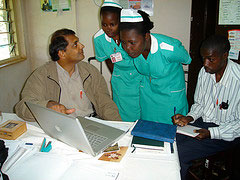About Sustainable Ponseti Clubfoot Care
What is Clubfoot?
Congenital clubfoot is a prevalent condition that affects children worldwide. Each year, approximately 100,000 children are born with this birth deformity, which causes the foot to turn inward due to an imbalance in muscles and ligaments. Without proper diagnosis or treatment, clubfoot can severely impact an individual’s mobility and quality of life. In countries where access to healthcare is limited by economic or geographic barriers, untreated clubfoot imposes significant physical, social, psychological, and financial burdens on patients, their families, and their communities.
How is Clubfoot Treated?
Historically, congenital clubfoot was treated primarily through surgery. However, in 1963, Dr. Ignacio Ponseti from the University of Iowa developed a groundbreaking, non-invasive treatment known as the Ponseti Method. This method involves correcting the deformity through a series of five plaster casts applied with gentle manipulations, followed by four years of bracing to maintain the correction. The Ponseti Method boasts a remarkable 95% success rate and is particularly well-suited for low-resource settings where surgical interventions may not be feasible.
Our Initiatives
At UBC Global Orthopaedics, we are committed to supporting the Department of Orthopaedics in its advocacy efforts to improve global clubfoot care. We aim to inspire students and faculty members to get involved in meaningful initiatives that make a tangible impact. Whether you’re interested in research, clinical outreach, or education, there are many ways to contribute. Explore our projects below to learn how you can take the first step toward making a difference in the lives of children and families worldwide.
Uganda Sustainable Clubfoot Care Project (USCCP)

The journey began with the Uganda Sustainable Clubfoot Care Project (USCCP) initiatives supported by Global Affairs Canada to build sustainable capacity for Ponseti clubfoot management in these countries.
Sustainable Clubfoot Care in Bangladesh (SCCB)

Bangladesh in 2012 had an estimated 5,000 children born with clubfeet, most of which could not access treatment and therefore were neglected and grew up with painful disability, unable to work.
Sustainable Clubfoot Care in Bangladesh (SCCB) is a UBC project aimed to eliminate disability from neglected clubfoot by building national capacity within its public healthcare institutions and public schools of healthcare to teach and treat children with clubfeet by the Ponseti non-surgical treatment.
Ponseti Clubfoot Navigator (PCN)

Today, the focus is on the Ponseti Clubfoot Navigator (PCN), an innovative digital health application designed to enhance the treatment of children with clubfoot using the Ponseti Method. This electronic medical record system doubles as a clinical decision-support tool, empowering healthcare providers to deliver more efficient and effective care.